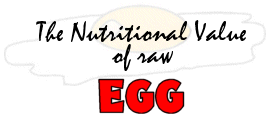|
|
Nutrient |
Units |
Value per
100 grams of
edible portion |
Sample
Count |
Std.
Error |
1 large
-------
50 g^1 large
| |
Proximates
|
|
|
|
|
|
|
Water
|
|
|
|
|
|
|
Energy
|
|
|
|
|
|
|
Energy
|
|
|
|
|
|
|
Protein
|
|
|
|
|
|
|
Total lipid (fat)
|
|
|
|
|
|
|
Ash
|
|
|
|
|
|
|
Carbohydrate, by difference
|
|
|
|
|
|
|
Fiber, total dietary
|
|
|
|
|
|
|
Sugars, total
|
|
|
|
|
|
|
Sucrose
|
|
|
|
|
|
|
Glucose (dextrose)
|
|
|
|
|
|
|
Fructose
|
|
|
|
|
|
|
Lactose
|
|
|
|
|
|
|
Maltose
|
|
|
|
|
|
|
Galactose
|
|
|
|
|
| |
Minerals
|
|
Calcium, Ca
|
|
|
|
|
|
|
Iron, Fe
|
|
|
|
|
|
|
Magnesium, Mg
|
|
|
|
|
|
|
Phosphorus, P
|
|
|
|
|
|
|
Potassium, K
|
|
|
|
|
|
|
Sodium, Na
|
|
|
|
|
|
|
Zinc, Zn
|
|
|
|
|
|
|
Copper, Cu
|
|
|
|
|
|
|
Manganese, Mn
|
|
|
|
|
|
|
Selenium, Se
|
|
|
|
|
| |
Vitamins
|
|
Vitamin C, total ascorbic acid
|
|
|
|
|
|
|
Thiamin
|
|
|
|
|
|
|
Riboflavin
|
|
|
|
|
|
|
Niacin
|
|
|
|
|
|
|
Pantothenic acid
|
|
|
|
|
|
|
Vitamin B-6
|
|
|
|
|
|
|
Folate, total
|
|
|
|
|
|
|
Folic acid
|
|
|
|
|
|
|
Folate, food
|
|
|
|
|
|
|
Folate, DFE
|
|
|
|
|
|
|
Vitamin B-12
|
|
|
|
|
|
|
Vitamin A, IU
|
|
|
|
|
|
|
Vitamin A, RAE
|
|
|
|
|
|
|
Retinol
|
|
|
|
|
|
|
Vitamin E (alpha-tocopherol)
|
|
|
|
|
|
|
Tocopherol, beta
|
|
|
|
|
|
|
Tocopherol, gamma
|
|
|
|
|
|
|
Tocopherol, delta
|
|
|
|
|
|
|
Vitamin D
|
|
|
|
|
|
|
Vitamin K (phylloquinone)
|
|
|
|
|
| |
Lipids
|
|
Fatty acids, total saturated
|
|
|
|
|
|
|
4:0
|
|
|
|
|
|
|
6:0
|
|
|
|
|
|
|
8:0
|
|
|
|
|
|
|
10:0
|
|
|
|
|
|
|
12:0
|
|
|
|
|
|
|
14:0
|
|
|
|
|
|
|
15:0
|
|
|
|
|
|
|
16:0
|
|
|
|
|
|
|
17:0
|
|
|
|
|
|
|
18:0
|
|
|
|
|
|
|
20:0
|
|
|
|
|
|
|
22:0
|
|
|
|
|
|
|
24:0
|
|
|
|
|
|
|
Fatty acids, total monounsaturated
|
|
|
|
|
|
|
14:1
|
|
|
|
|
|
|
16:1 undifferentiated
|
|
|
|
|
|
|
18:1 undifferentiated
|
|
|
|
|
|
|
20:1
|
|
|
|
|
|
|
22:1 undifferentiated
|
|
|
|
|
|
|
Fatty acids, total polyunsaturated
|
|
|
|
|
|
|
18:2 undifferentiated
|
|
|
|
|
|
|
18:3 undifferentiated
|
|
|
|
|
|
|
18:4
|
|
|
|
|
|
|
20:4 undifferentiated
|
|
|
|
|
|
|
20:5 n-3
|
|
|
|
|
|
|
22:5 n-3
|
|
|
|
|
|
|
22:6 n-3
|
|
|
|
|
|
|
Cholesterol
|
|
|
|
|
| |
Other
|
|
Alcohol, ethyl
|
|
|
|
|
|
|
Caffeine
|
|
|
|
|
|
|
Theobromine
|
|
|
|
|
|
|
Carotene, beta
|
|
|
|
|
|
|
Carotene, alpha
|
|
|
|
|
|
|
Cryptoxanthin, beta
|
|
|
|
|
|
|
Lycopene
|
|
|
|
|
|
|
Lutein + zeaxanthin
|
|
|
|
|
|
|
|

It may be difficult to compare the nutrients in various types of eggs
because of the differences in their sizes.
This table compares different
types of whole eggs based on an equal portion, which is 100 grams.
| Component |
Chicken |
Quail |
Duck |
Turkey |
Goose |
| Calories |
147 |
158 |
185 |
171 |
185 |
| Total Fat |
9.9 g |
11.1 g |
13.8 g |
11.9 g |
13.3 g |
| Saturated Fat |
3.1 g |
3.6 g |
3.7 g |
3.6 g |
3.6 g |
| Cholesterol |
423 mg |
844 mg |
884 mg |
933 mg |
852 mg |
| Carbohydrate |
0.8 g |
0.4 g |
1.5 g |
1.2 g |
1.3 g |
| Protein |
12.6 g |
13.1 g |
12.8 g |
13.7 g |
13.9 g |
| Vitamin A |
487 IU |
543 IU |
674 IU |
554 IU |
650 IU |
| Calcium |
53 mg |
64 mg |
64 mg |
99 mg |
60 mg |
| Iron |
1.8 mg |
3.6 mg |
3.8 mg |
4.1 mg |
3.6 mg |
| Sodium |
140 mg |
141 mg |
146 mg |
151 mg |
138 mg |

|
|
With all the media attention on cholesterol, consumers often lose sight of the fact that eggs are a nutrient rich, affordable contributor to a healthy diet. Not only do eggs contain the highest quality source of protein available but they also contain almost every essential vitamin and mineral needed by humans [Sorry, no vitamin C in eggs. Chickens, unlike humans, can produce their own vitamin C and don't need to get it from the diet.]. In fact, egg protein is of such high quality that it is used as the standard by which other proteins are compared. Eggs have a biological value (efficacy with which protein is used for growth) of 93.7%. Comparable values are 84.5% for milk, 76% for fish, and 74.3% for beef. Eggs really are the best protein money can buy, and it has all those other valuable vitamins and minerals too.
Egg yolk color is determined by the type of feed a hen eats. A wheat-based diet will produce a pale yellow yolk, while a corn or alfalfa-based diet yields a darker yellow yolk. The color of the yolk does not indicate egg quality, freshness or nutritional value.
Energy value of eggs
A medium egg has an energy value of 76 kilocalories (318 kilojoules) and the consumption of one egg daily would contribute only around 3% of the average energy requirement of an adult man; 4% for an adult woman.
With their significant protein, vitamin and mineral content and relatively low saturated fat content, eggs are a valuable component in a healthy diet.
Protein
Eggs are an excellent source of protein. Egg protein is of high biological value as it contains all the essential amino acids needed by the human body. Eggs therefore complement other food proteins of lower biological value by providing the amino acids that are in short supply in those foods. 12.5% of the weight of the egg is protein and it is found in both the yolk and the albumen. Although protein is more concentrated around the yolk, there is in fact more protein in the albumen.
On the evaluation scale most commonly used for assessing protein, egg is at the highest point, 100, and is used as the reference standard against which all other foods are assessed.
Vitamins
Eggs contain most of the recognised vitamins with the exception of vitamin C. The egg is a good source of all the B vitamins, plus the fat-soluble vitamin A. It also provides useful amounts of vitamin D, as well as some vitamin E.
Minerals
Eggs contain most of the minerals that the human body requires for health. In particular eggs are an excellent source of iodine, required to make the thyroid hormone, and phosphorus, required for bone health. The egg provides significant amounts of zinc, important for wound healing, growth and fighting infection; selenium, an important antioxidant; and calcium, needed for bone and growth structure and nervous function. Eggs also contain significant amounts of iron, the vital ingredient of red blood cells, but the availability of this iron to the body is uncertain.
Carbohydrate and dietary fibre
Eggs contain only traces of carbohydrate and no dietary fibre.
Fat
10.8% of the egg content is fat. The fat of an egg is found almost entirely in the yolk; there is less than 0.05% in the albumen.
Approximately 11% of an egg’s fatty acids are polyunsaturated, 44% monounsaturated and only 29% saturated.
Cholesterol
Cholesterol and Lecithin are fat-like substances and are essential to the structure and function of all cells in the body. Cholesterol helps to maintain the flexibility and permeability of cell membranes and is also a raw material for the fatty lubricants that help to keep the skin supple. Cholesterol is essential for the production of sex hormones, cortisol, vitamin D and bile salts.
Lecithin is involved in general lipid transportation in the blood and in the metabolism of cholesterol. |


Check out our Alternative Health Care
page
and our Canine DIET page
|
|

